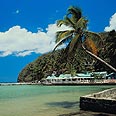
Praying under the tropical sun
Every Caribbean island has its own slice of Jewish history, a historic synagogue and links to colonial settlements. Considered heretics in Europe, Jews fled to Caribbeans - becoming pirates, merchants, traders and plantations owners
And when Christopher Columbus set sail in 1492, Jews, Marranos, and Conversos were aboard the Nina, Pinta, and Santa Maria, including a ship's doctor and navigator.
Some believe that Columbus himself was a Spanish Jew, which certainly gave him reason to set sail for foreign shores and establish colonies as a refuge from religious persecution.
Just five years later, in 1497, Jews were banned from Portugal as well, and a great wave of migration began. By 1540, Columbus had established a colony in Jamaica, where the Inquisition could not reach its shores. Some of the Jewish settlers became pirates with the aim of attacking Spanish ships as revenge for the Inquisition.
Samuel Pallache and Moses Cohen Henriques were among the famous Jewish pirates, seizing shipments of Spanish gold and silver. But the Inquisition eventually reached the shores of Jamaica as well, leading the Jews there to support the British invasion in 1655, hoping that British rule would be more lenient than the Spanish.
By this time the Diaspora was forming throughout the Caribbean, as Europe was less and less hospitable. Dutch Jews eventually settled in the Netherlands' Caribbean islands, especially in Willemstad, the capital of Curacao, where Mikveh Israel-Emanuel Synagogue was established in 1674.
Their current building dates from 1730, and Curacao still has an active Jewish community with roots in the Sephardic tradition. The ruins of the old Honen Dalim synagogue (circa 1739) in St. Eustatius, a smaller Dutch island than Curacao, bear witness to its former Jewish population.
The book "Once Jews: Stories of Caribbean Sephardim" by Josette Capriles Goldish was published in 2009. She tells the tales of families such as the Lopex Penhas, De Marchenas, Delvalles, Sassos, Seniors, Curiels, and Al-vares Correas, all Sephardic Jews from Curacao, who were retailer, traders, politicians, poets, industrial entrepreneurs, doctors, lawyers, and other professionals.
"As they migrated away from Curacao in the 19th century, they and their descendants fully assimilated into their community," says Goldish. "Yet, throughout the centuries, the generations that came after them continued to remember their Sephardic, Curacaoan heritage." They are another link to the Jewish settlers who fled the Spanish.
Promised land
Barbados and Suriname also had Jewish colonies, as the English encouraged Jewish traders to settle there. A historic Jewish cemetery - perhaps the oldest in the new world - still exists in Barbados, where a few of the graves date back to the 1660s and include Samuel Hart, son of Moses Hart, and Moses Nehemiah, the first Jew to live in Virginia.
A historic building dating from 1654 currently houses a library, but was once the Nidhei Israel Synagogue, which was rededicated in a new location in 1987. The Old Jewish cemetery in Bridgetown was restored.
In Charlotte Amalie, the capital of St. Thomas, the synagogue has floors made of sand (as was the trend throughout the islands), and many say that is due to the fear of the Inquisition. It is said that the congregation met behind closed doors and the sand helped muffle their voices, but eventually there was a large openly flourishing Jewish community on this once-Danish island.
There were also Jewish settlers in Cuba and Puerto Rico. Havana has several synagogues but there are only a few hundred Jews remaining of the more than 15,000 who once lived there (most fled to escape Castro's revolution).
Of course Jews could not have lived in the Caribbean without being involved in sugar cane and rum. Some of the Jewish families in the French West Indies owned slaves but do not seem to have been leaders in the slave trade.
Once Martinique became French in 1635 a large Jewish settlement began to form on the island, where the earliest-known synagogue dates from 1667. But by 1683, King Louis XIV expelled the Jews from Martinique and many went to join the community established in Curacao.
After the French Revolution, religious discrimination was outlawed but the Jewish population remained small in the French islands. A modern Jewish community formed in Fort de France by Jews from Northern Africa and France in the 1960s and 70s, and today a synagogue exists in Schoelcher.
Other Jews from Portugal fled to Brazil, where some ran sugar cane plantations. Of these, some later moved to Guadeloupe, establishing a small community, which has been revived in the past few decades.
Every island has its own slice of Jewish history, a historic synagogue, and links to colonial settlements. Considered heretics in Europe, they fled to the promised land of the Caribbean, becoming pirates, merchants, traders, and plantations owners. Their history is an important element in the overall history of the Caribbean.
So the next time you sip a glass of rum, or walk down a historic street in an island's capital, let your imagination take you back to the days.
Reprinted with permission from Shalom Life










